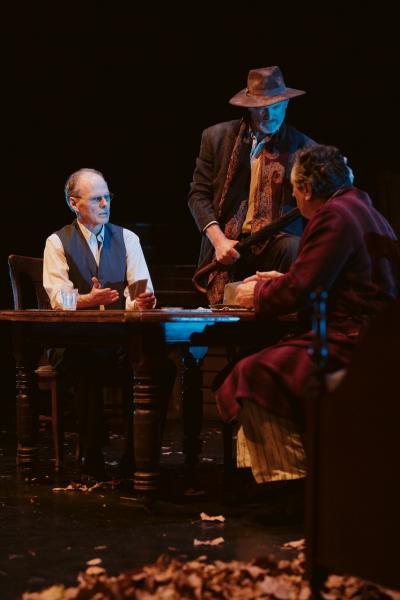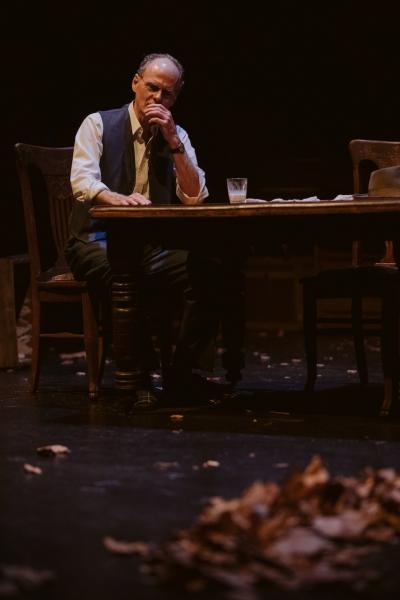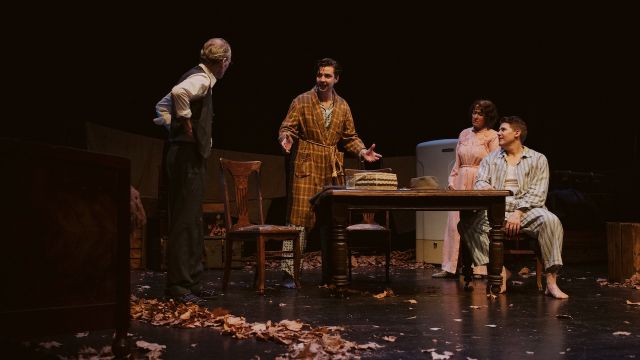Death of a Salesman
Arthur Miller’s subject is America – or the common man versus America. Apart from a few details (automobiles and other product names, wages and prices) Death of a Salesman is as accurate, insightful and pertinent as it was when first performed in 1949. We don’t have the same crippling foundation myths as the USA (we have our own), but since we seem eager always to follow, imitate and enmesh with the USA, Miller’s play is just as relevant and timely for us.
The salesman of the title is Willy Loman (Paul English), a man trapped in an American ideology about success and how to achieve but now at the end of his career – such as it was – and refusing to admit it. His mantra about being not just liked but ‘well-liked’ has not served him well – and he has infected his sons Biff (Charlie Cousins) and Happy (Ross Dwyer) with the same delusionary bullshit.
Paul English gives us a towering, sustained performance, never stooping to making Willy ‘likeable’. On the contrary, Willy has become an irritable domestic bully, who must assert his delusions with greater and greater vehemence. His decline and fall are an understandable spectacle that can invite only our abstract sympathy. Reduced to insignificance in the material world, he is a full of sound and fury. At times he seems close to madness when he deliberately, desperately ignores or misinterprets what is said directly to him. His only joy is his nostalgia for the happy days when his sons were boys (to be moulded) and he worked with his hands around the house. Now, he eerily talks to himself in the night, reliving conversations from long ago with his older son Biff, his favourite, but now, in the present, his greatest disappointment.

Willy is sustained by his wife Linda (Margot Knight): she is the realist who keeps the household accounts, who suspects Willy’s frequent car accidents are not accidents, but at the same time is his enabler, rarely contradicting the self-protective nonsense he spouts. Margot Knight’s performance is the equal of Paul English’s. She holds the ambivalence of the ‘good wife’ in beautifully judged balance. When she defends Willy to Biff and Happy, in the famous ‘attention must be paid’ speech, she made me cry. It’s a defiant speech which denies what she knows, but she makes it out of fierce love for her man – despite everything. Linda Loman is much more than a supporting role even if the centre of the play is Willy’s relationship with Biff.
Biff as a boy was Willy’s great hope. Biff had personality, charm, smarts – he was well-liked – and a football star. Biff was also lazy, relying too much on the charm that his father endorsed and encouraged. Charlie Cousins beautifully embodies the exuberant, overconfident kid in the past, and, in the present, the disillusioned rural drifter whose dream of a ranch out west in as much a delusion as any of his father’s. Ross Dwyer’s Happy, meanwhile, provides the necessary dramatic contrast and he does it with fine judgement. Happy’s tragedy – if that’s the word – is that Willy is just not that interested in him – and never will be. Low expectations. Happy’s a womaniser, a facile liar, a small cog in the big wheel, a goofy, floppy guy who kids himself he’s on the way up, but who, in the end, can’t let go of his father’s ‘how to succeed’ beliefs.
Other cast ably support the central quartet. Bernard (Juan Fernando Monge) is the swat next door; he admires the athletic Biff, but he does the schoolwork and doesn’t care about being well-liked – and who succeeds? Bernard. His father, Daniel (Joe Petruzzi) is the Lomans’ amiable, generous, thick-skinned neighbour – another contrast to Willy’s uptight, anxious meanness. A near surreal note is Stetson wearing Uncle Ben (Andrew Blackman), the real success that Willy might have been. Ben appears in flashbacks and in Willy’s tortured imagination, a source of regret and admonishment, an adventurer who took the risks Willy didn’t. Kim Denman, known only in the text as The Woman, is Willy’s little fling on his sales trips to Boston. She is more of a plot device than a character, but Denman makes her a sexy, teasing minx – a contrast, of course, to Linda.

Like many Arthur Miller plays, one can’t help feeling that a judicious edit wouldn’t hurt – but that may come from a modern (or screenwriter) sensibility. On the other hand, his illuminating segues between past and present are bold, as are the drifts into hallucination and memory. Such things could present problems for director Chris Tomkinson, but he solves them elegantly as he solves so much else here: we are not confused, we know when and where we are. Some touches, such as characters running and circling the central action, are perhaps infelicitous and unnecessary. Nevertheless, we are rivetted all the way by the drama of these characters.
The play begins and ends with all the furniture covered in dust sheets as if the story we’ll be told is already in the past and then, at the end, is decisively over. A way of life seems to be over too. Appliances don’t last, and the Lomans’ suburban house and its light is blocked and shadowed by apartment towers. One of Willy’s desperate acts is to plant vegetables in the sunless yard.
The literal time frame of the play in the present is two, maybe two and a half days, but we are taken on a long journey into the past too, and into the psyches of the Lomans, caught in the ideology of post-war American prosperity and how to win.
Michael Brindley
This Hearth Theatre production premiered to great and deserved acclaim at fortyfivedownstairs in 2022. Now, with some few cast changes, it has been on tour since May this year, visiting six venues before landing at Chapel off Chapel for only six performances. During its tour, the production has garnered even more glowing reviews and audience responses - which is yet more impressive in the light of the conditions of touring. Moving from place to place on its whistle stop tour – one performance here, two there, another somewhere else – has necessitated design changes and constant adaptation to different spaces and facilities. It’s also meant close and supportive collaboration – and stamina - from all involved. It’s a grand achievement for determined and out-on-a-limb producer Charlie Cousins, director Tomkinson and his superb cast and ‘creatives’.
The production will continue touring in 2023: 30 Bunjil Place, Narre Warren 30 August; Capitol Theatre, Bendigo 1 September; Whitehorse, Nunawading 8 & 9 September; Gippsland Performing Arts Centre, Traralgon 23 September; Dubbo Regional Centre, Dubbo NSW 18 August.
Subscribe to our E-Newsletter, buy our latest print edition or find a Performing Arts book at Book Nook.

